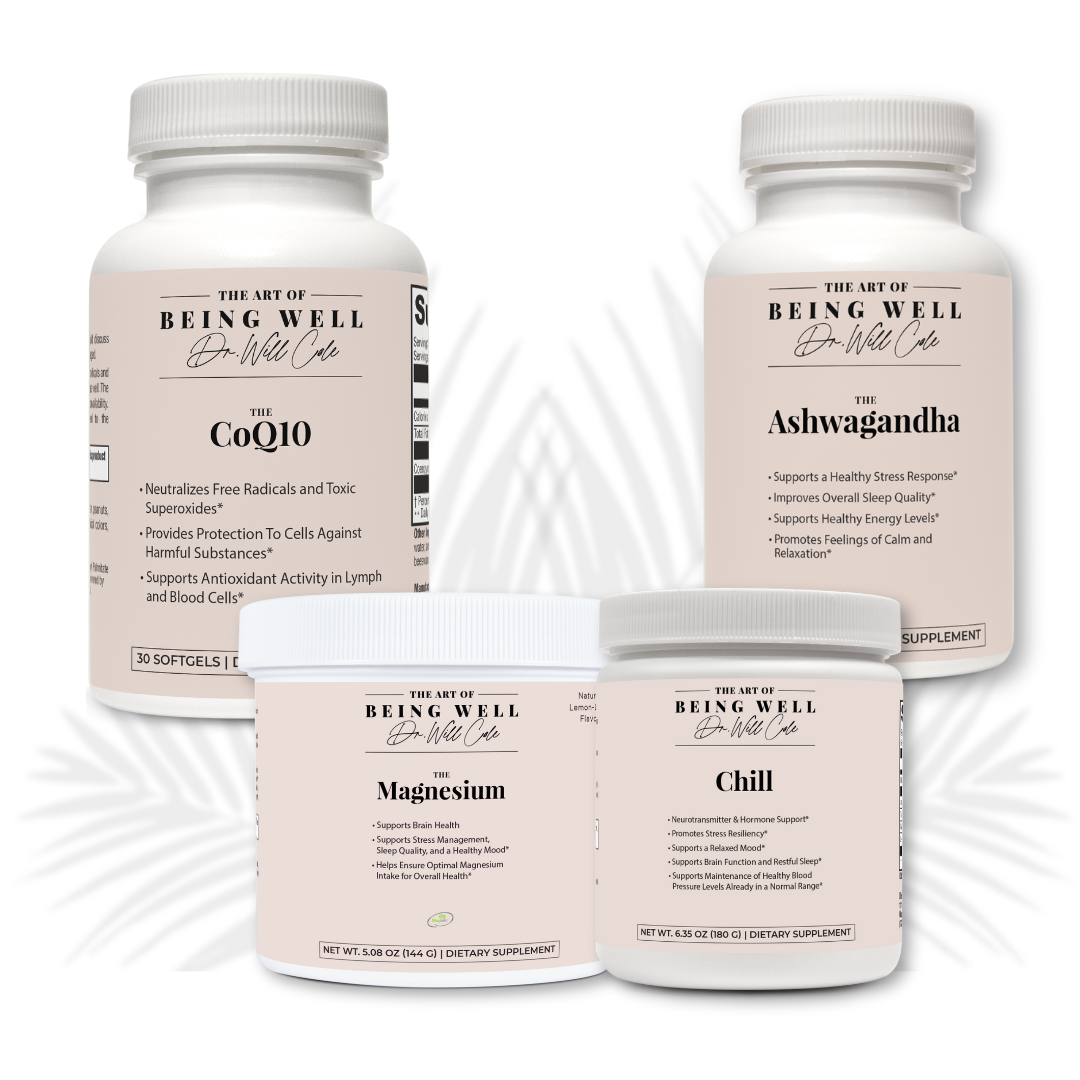Balancing Your Cortisol Levels For Stress-Free, Healthier Living

If you’ve heard of “flight or flight,” the human response to stress, you’ve likely heard about cortisol. Often called “the stress hormone,” cortisol is produced by our adrenal glands when we encounter threats, real or perceived. It’s been hugely beneficial in the course of human evolution and even in responding to the real threats and challenges of modern day-to-day life. It’s what helps us run from lions, wake up in the morning, and nail high-pressure job interviews.
Unfortunately, too much cortisol can be damaging to the body and mind. And with smartphones dinging, bright lights blaring, screens turned on into the wee hours of the night, long work hours, and a lack of stress-alleviators--many Americans suffer from cortisol much higher than healthy or helpful levels.
Understanding High Cortisol
While high cortisol can be caused by medical conditions or illness such as adrenal tumors, certain medications or even pregnancy, most suffering from high cortisol have their stressful lifestyles to blame. Common culprits of high cortisol include:
- Poor sleep hygiene
- Frequent caffeine consumption
- Too much screen time (TV, phone, laptop)
- Stressful jobs
- inactivity/no daily movement routine
- Lack of fulfilling activities outside of work
- Lack of social and familial connections
- Frequent alcohol consumption
If any of these sound familiar, you may want to look at your cortisol levels and work towards healthier lifestyle choices that are more supportive of healthy stress and cortisol levels.
Symptoms of high cortisol can present in many ways including:
- Unexplained weight gain
- Changes to your skin appearance and health
- Muscle weakness
- Mood instability associated with anxiety, depression, and overall sadness
- High blood pressure
- High blood sugar
- Fatigue
- Trouble sleeping
- Headaches
- Upset stomach
If these symptoms sound difficult to pinpoint and hard to attribute to any one thing, it’s because they unfortunately are. The best way to determine your cortisol levels is through urine, blood, or sweat tests.
As one of the first functional medicine telehealth clinics in the world, we provide webcam health consultations for people around the globe, which makes it easier to get to the bottom of what is going on in your body so you can make informed choices for effective changes.
But if you’re beginning your cortisol-managing journey on your own, there are a couple fool-proof ways to kick things off.
1. Increase Your Physical Activity
Being physically active every day is one of the best things you can do for yourself and your stress levels. (1) While hard-core HIIT workouts and fancy pilates classes totally count, some good old-fashioned walking and some low-cost resistance training will also do the trick.
The best way to hold yourself accountable for daily activity is to schedule it in advance, ideally in the morning. Make sure you have time set aside to be active. There are so many free online resources if you’re short on time or motivation. Walk, dance, run, kickbox, swim, take a group class, take an online class…as long as you’re moving you’re doing good things for your cortisol levels.
2. Optimize Your Sleep
Sleep is essential to get right when managing your cortisol. Being higher in the morning, cortisol plays a role in helping wake up in the mornings. Honoring our natural sleep cycles helps keep these hormonal balances in check throughout the day and overtime. (2)
For good sleep hygiene, you’re ideally going to sleep and waking up at roughly the time each night and getting enough sleep (6-9+) hours depending on your unique needs.
If you’re having trouble sleeping, you’re not alone. There are many ways to improve your sleep including supplements like magnesium, blue light blocking during the day, and getting natural sunlight first thing in the morning.
3. Practice Meditation
Mediation can be intimidating, but getting started is straightforward and simple. With so many health benefits, cultivating a meditation practice is one of the best things you can do for your stress levels and overall health. (3)
To start, set aside 5 minutes every day without distractions to begin exploring meditation. There are books, online guides, apps and videos--many of them free--that can walk you through the basics and the different ways to approach meditation, breathwork, and mindfulness.
4. Prioritize Social Connections
In a day and time where we’re more “connected” than ever to hundreds or thousands of “friends” and follows, so many of us are lacking in real human connection. If you’re not lucky enough to live near a family you get along with and see regularly, it is important to cultivate a group of friends and/or coworkers that you can socialize, laugh, and create community and memories with.
Science tells us that our social connections are part of the fabric that help us regulate our stress and cortisol system. (4)
5. Limit Caffeine
Consuming too much caffeine, especially late in the day can wreak havoc on your sleep and in association, your cortisol. If you find yourself reaching for that 3rd cup of coffee every day or going through energy drinks one after the other---consider scaling back and swapping it in for an herbal tea, something decaf, or just plain old water. High blood pressure, high blood sugar, fatigue, trouble sleeping, headaches, and an upset stomach can all be signs of a cortisol imbalance.
Supplements to Support Your Journey
To further support your body in managing stress and balancing cortisol levels, consider incorporating these supplements into your routine:
- Brain Adrenal Balancer: Helps regulate adrenal function and supports a balanced stress response.
- Magnesium: Essential for relaxation and promoting better sleep.
- Ashwagandha: An adaptogenic herb known for its ability to reduce stress and improve overall well-being.
- Mood Support Stack: All in one place, everything you need for achieving that balance you've been looking for.
Starting your journey towards balanced cortisol levels and better stress management can feel overwhelming, but with the right steps and support, it is entirely achievable.
FAQs
Higher than expected cortisol levels can have negative effects on your body and mind across the board. High blood pressure, high blood sugar, fatigue, trouble sleeping, headaches, and upset stomach are all symptoms to look out for.
Females may be more susceptible to cortisol imbalances because of the cyclic nature of their hormones over a 28-day cycle vs. a 24-hour cycle as seen in men. Women who are focusing on balancing their overall hormone balance as well as lifestyle intervention strategies can manage their cortisol levels.
Getting daily exercise is more important than getting “the best” type of exercise infrequently. So the exercise that you enjoy and work into your daily routine is going to be the best for you.
Cortisol is essential in regulating our “wake” cycle as responding to stress effectively, like running from the lion or fighting the enemy.
Start Your Health Journey Today
FUNCTIONAL MEDICINE CONSULTATIONS FOR PEOPLE AROUND THE WORLD
- Jackson, Erica M. Ph.D., FACSM. STRESS RELIEF: The Role of Exercise in Stress Management. ACSM’s Health & Fitness Journal 17(3):p 14-19, May/June 2013. | DOI: 10.1249/FIT.0b013e31828cb1c9
- Rachel Leproult, Georges Copinschi, Orfeu Buxton, Eve Van Cauter, Sleep Loss Results in an Elevation of Cortisol Levels the Next Evening, Sleep, Volume 20, Issue 10, October 1997, Pages 865–870, https://doi.org/10.1093/sleep/20.10.865
- Anna Seewald & Winfried Rief. (2023) Therapist's warmth and competence increased positive outcome expectations and alliance in an analogue experiment. Psychotherapy Research 0:0, pages 1-16.
The information on this website has not been evaluated by the Food & Drug Administration or any other medical body. We do not aim to diagnose, treat, cure or prevent any illness or disease. Information is shared for educational purposes only. You must consult your doctor before acting on any content on this website, especially if you are pregnant, nursing, taking medication, or have a medical condition.
Our content may include products that have been independently chosen and recommended by Dr. Will Cole and our editors. If you purchase something mentioned in this article, we may earn a small commission.

BY DR. WILL COLE
Dr. Will Cole, DNM, IFMCP, DC is a leading functional medicine expert who consults people around the globe, starting one of the first functional medicine telehealth centers in the world. Named one of the top 50 functional and integrative doctors in the nation, Dr. Will Cole provides a functional medicine approach for thyroid issues, autoimmune conditions, hormonal imbalances, digestive disorders, and brain problems. He is also the host of the popular The Art of Being Well podcast and the New York Times bestselling author of Intuitive Fasting, Ketotarian, Gut Feelings, and The Inflammation Spectrum.

Gut Feelings
Healing The Shame-Fueled Relationship
Between What You Eat And How You Feel

